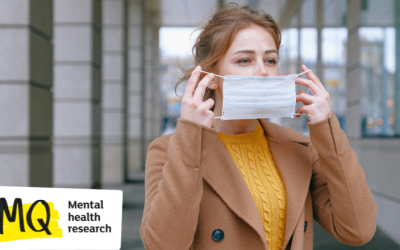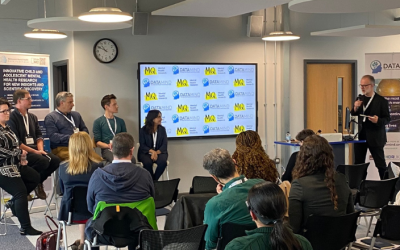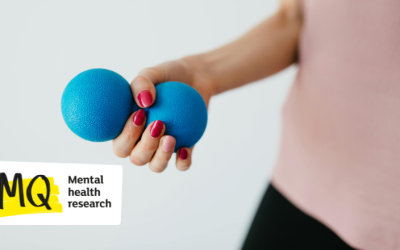This World Mental Health Day (10 October 2023), the theme is Mental Health is a Human Right. We at MQ have been striving for the past 10 years to make mental health a human right in several ways. One such way is by focusing on addressing inequalities that exist in research into mental health. Here’s how we’re doing that…
Health as a concept is holistic. Mental health and physical health are linked. However for many years, physical health has received more funding for research, more focus and therefore more developments in treatment.
Now, human rights are a part of the mental health agenda, and charities, like MQ and other advocates are calling for equality for mental health alongside general health. Parity is desperately needed in terms of funding and to close the gap between how those in physical health crisis are treated and those in mental health crisis are treated. MQ aims to have maximum impact by focusing our efforts on the substantial unmet needs within mental health. 35 of MQ’s 63 projects directly challenge inequalities in mental health and mental health research.
“Thanks to MQ, in addition to addressing the objectives and answering our research questions, we uncovered new insights and questions about unpacking the role of structural inequalities in research.” Professor Jessica Deighton, MQ researcher
Mental Health Affects Physical Health
There’s a huge inequality in how mental health is treated and the effects of this are undeniable. A report by the UN Human Rights office showed people with mental health conditions and those with psychosocial disabilities experience disproportionately higher rates of poor physical health; and have a reduced life expectancy – a 20-years fewer for men and 15 years for women - compared with others in the population. Stigma is also an important factor in quality of care and access to all services those in need require.
This is being looked into further in MQ’s Gone Too Soon project in which 40 experts have given clear recommendations for how we can address and improve the early mortality rates and prevent people with severe mental illness from dying earlier than others.
Education and Employment
If education is interrupted or restricted this can impact an individuals long-term mental health outcomes. Lack of education makes routes to employment less accessible which in itself can increase the risk of depression and anxiety disorders. People with severe mental illnesses are more likely to be unemployed, exacerbating and continuing social inequalities.
MQ has conducted research that helped create the Peopleful report which showed 1 in 4 employees is at high risk of burnout, with a further 22% showing signs of stress-related ill health. The report also showed younger employees were at significantly higher risk of Stress-related Ill-health than older employees, whereas High Burnout Risk was experienced at a relatively consistent rate, but was considerably lower among those aged over 60.
“Research and data is so important in mental health – if we don’t have that, we’re unable to change policies, and we’re unable to provide different services for communities.” Amazin LeThi, MQ Ambassador
Stigma and Discrimination
There’s also a common idea that people with mental health conditions are not capable of responsibility or agency over decisions which can also affect the care they receive, their treatment and access to treatment.
To address these inequalities, MQ has been championing the use of PPIE – patient and public involvement and engagement in research we support. This means people with lived experience are a key part of research that inform outcomes that can impact the future of mental health. Their voices are heard, included and baked into the heart of the vast majority of research studies MQ facilitates.
Discrimination, stereotypes and stigma in all areas of life can get in the way of developing healthy relationships, social networks and happy environments that help us all live healthier and more fulfilling lives.
Discrimination of people with mental illness and disabilities who belong to racial and ethnic minorities, discrimination that takes many forms, also adds to the difficulty people face to realise their right to mental health.
There is no doubt that socio-economic, racial and gender inequalities contribute to poor mental health. Difficult financial circumstances naturally add to stress which can impact mental wellness. Discrimination whether due to gender, sexuality, race, religion, disability, neurodiversity or other circumstance adds to stress which can impact mental wellness. Easy access to healthcare for both mental and physical health is a privilege without which many of us experience increased stress.
People in some parts of the world also face inequalities when it comes to education about mental health, only accessing information from the internet or not being taught it in schools or communities or the workplace.
These inequalities don’t just cause and exacerbate mental illness but also act as barriers to high quality research too. Most mental health research is conducted in high-income countries, particularly the UK and USA. MQ is a global research funder and has supported research on 6 continents, including in low-and-middle-income countries.
“MQ are putting in extensive work to bring new ground-breaking research to the forefront to improve lives.” – Tommy Hatto, MQ Ambassador
Young People and Inequality
Research into children and young people's mental health is hugely underfunded, despite 75% of mental illnesses developing before adulthood. MQ is focusing on progress in understanding youth mental illness, for example with the IDEA project.
The IDEA or Identifying Depression in Early Adolescence, project was an ambitious multi-national and multi-discipline project that aimed to better understand how cultural, social, biological and environmental factors lead to the development of depression in 10–24-year-olds across the UK, Brazil, Nepal, New Zealand and the USA.
The project went on to successfully develop a tool that can be used to predict which young people are at greatest risk of developing depression in later life. The project also developed cutting edge techniques through the use of biomarkers, to monitor mental health in adolescents through digital technology and passive monitoring.
“MQ and the Brighter Futures team funded the IDEA Project and continued to support us, allowing significant expansion of our work and bringing us a few steps closer to reducing the global burden associated with adolescent depression.” Prof Valeria Mondelli, Clinical Professor of Psychoneuroimmunology at King’s College London.
Inequality of Research
Most mental health research in the world is done in Higher Income countries, which is why MQ actively addresses this inequality by supporting more research conducted in Lower and Middle Income Countries. One example is the IDEA project mentioned above.
Although 9 out of 10 children and adolescents worldwide live in low-and-middle-income countries, only 10% of the scientific publications in the world are produced there.
The IDEA project conducted research on adolescent depression where it is most needed, in these countries where so many adolescents live. It went on to develop the IDEA risk score, also tested in other countries. This meant the data from 5 different continents can help researchers disentangle cultural influences that contribute to the risk for developing depression.
In other words, this means researchers will ultimately be able to prevent and decrease adolescent depression across the globe.
“None of this progress is possible with MQ’s support.” Dr Christian Keeling, Associate Professor of Child Adolescent Psychiatry, Universidade Federal do Rio Grande do Sul, Brazil.
Help MQ address inequalities and fight for our human right to mental health by supporting us now.



